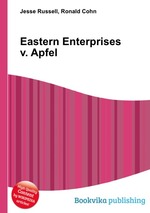Eastern Enterprises v. Apfel
Jesse Russell Ronald Cohn
бумажная книга
High Quality Content by WIKIPEDIA articles! Eastern Enterprises v. Apfel, 524 U.S. 498 (1998), was a case in which the Supreme Court of the United States held that the Coal Industry Retiree Health Benefit Act (Coal Act) constituted an unconstitutional regulatory taking of property which required the Act to be invalidated. The import of this decision is that it was made in the context of a purely economic regulation. The plurality examines the statute and its resultant harm as an ad hoc factual inquiry based on factors delineated in Penn Central such as the economic impact of the regulation, its interference with reasonable investment backed expectations, and the character of the governmental action.(Penn Central Transportation Co. v. New York City), The decision thereby moved beyond the traditional notions of equal protection which had been applied to economic regulation since the time of (Lochner v. New York), requiring extreme deference to Congress, and applied a regulatory takings analysis to the problem resulting in a much less defferential result. While the plurality recognizes that this is not a traditional takings case where the government appropriates private property for public use, they also state this is the type of case where the "Armstong Principle" of preventing the government from forcing some people alone to bear public burdens which, in all fairness and justice, should be borne by the public as a whole. (Armstrong v. United States) However, while the plurality seems to invalidate this particular law on takings grounds, the concurrences and the dissents warn of such an analysis as this should actually be examined under substantive due process or ex post facto theories.


